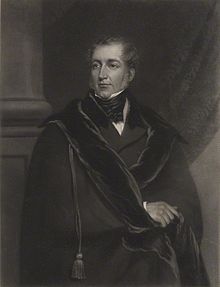Benjamin Hall, 1st Baron Llanover
The Lord Llanover | |
|---|---|
 | |
| President of the Board of Health | |
| In office 14 October 1854 – 13 August 1855 | |
| Monarch | Queen Victoria |
| Prime Minister | |
| Preceded by | New office |
| Succeeded by | William Cowper |
| First Commissioner of Works | |
| In office 21 July 1855 – 21 February 1858 | |
| Monarch | Queen Victoria |
| Prime Minister | The Viscount Palmerston |
| Preceded by | Sir William Molesworth |
| Succeeded by | Lord John Manners |
| Personal details | |
| Born | 8 November 1802 14 Upper Gower Street, London, England |
| Died | 27 April 1867 (aged 64) 9 Great Stanhope Street, Mayfair, Middlesex, England |
| Political party | Whig |
| Spouse | |
Benjamin Hall, 1st Baron Llanover PC (8 November 1802 – 27 April 1867), known as Sir Benjamin Hall between 1838 and 1859, was a Welsh civil engineer and politician. The famous "Big Ben" was named after him.
Political career
[edit]He was a Sheriff of Monmouthshire in 1826. He was elected Member of Parliament for Monmouth in May 1831, but his name was erased from the return already in July of the same year. However, he was re-elected for the same constituency in December 1832.[1] He was instrumental in the passing of the Truck Acts of 1831 and campaigned against the abuse of parliamentary election expenses and championed the right of people in Wales to have religious services in Welsh. He also engaged in bitter controversy with the bishops on the state of the Anglican church in Wales and made attacks on the shameless exploitation of church revenues, complaining of unbounded nepotism.[2] In 1837 he was returned for Marylebone[3] and the following year he was created a baronet.[4]
He served under Lord Aberdeen and then Lord Palmerston as President of the Board of Health between 1854 and 1855 and was sworn of the Privy Council in 1854.[5] In 1855 he introduced an Act of Parliament which led to the establishment of the Metropolitan Board of Works.
He became First Commissioner of Works the same year and was responsible for many environmental and sanitary improvements in London.[6] He oversaw the later stages of the rebuilding of the Houses of Parliament, including the installation of the 13.8-tonne hour bell, "Big Ben", in the clock tower. He was a tall man and many attribute its name to him.[7]
He remained as First Commissioner of Works under parliament until the Whigs lost power in 1858. The following year he was elevated to the peerage as Baron Llanover, of Llanover and Abercarn in the County of Monmouth.[8] From 1861 to 1867 he was Lord Lieutenant of Monmouthshire.[9]
Through his wife, Augusta Waddington, Hall inherited the Llanover estate in Monmouthshire.
Personal life
[edit]
Hall was a son of the industrialist Benjamin Hall. He went to Westminster School.
Lord Llanover married Augusta, daughter of Benjamin and Georgina Waddington of Ty Uchaf, Llanover in 1823. She was the sister of and co-heiress with Frances Bunsen, wife of the Prussian diplomat Baron Bunsen.[10]
Only one of their daughters reached adulthood. Augusta married Arthur Jones of Llanarth. Their son was Ivor Herbert, 1st Baron Treowen. Lord Llanover died in April 1867, aged 64, when the baronetcy and barony became extinct. Lady Llanover survived him by almost thirty years and died in January 1896.
References
[edit]- ^ "leighrayment.com House of Commons: Mitcham to Motherwell South". Archived from the original on 10 August 2009. Retrieved 28 July 2009.
{{cite web}}: CS1 maint: unfit URL (link) - ^ Friends of Torfaen Museum Trust. St. Bartholomew's Church, Llanover. 1996 See: http://www.roger.j.moss.btinternet.co.uk/church-history/lh.lwp/lh.htm[dead link]
- ^ "leighrayment.com House of Commons: Macclesfield to Marylebone West". Archived from the original on 10 August 2009. Retrieved 28 July 2009.
{{cite web}}: CS1 maint: unfit URL (link) - ^ "No. 19631". The London Gazette. 3 July 1838. p. 1488.
- ^ "No. 21629". The London Gazette. 17 November 1854. p. 3513.
- ^ Halliday S. The Great Stink of London. Thrupp, Gloucestershire: Sutton; 1999, p 59.
- ^ Whitechapel Bell Foundry The Story of Big Ben See: http://www.whitechapelbellfoundry.co.uk/bigben.htm – but see "The Welshman", 31 October 1856, p. 8.
- ^ "No. 22280". The London Gazette. 28 June 1859. p. 2514.
- ^ leighrayment.com The Peerage: Linklater of Butterstone to Lonsdale[usurped]
- ^ "Bunsen, Christian Karl Josias von, Baron von Bunsen in the Prussian nobility (1791–1860), diplomatist and scholar hostess and biographer". Oxford Dictionary of National Biography (online ed.). Oxford University Press. 2004. doi:10.1093/ref:odnb/53760. ISBN 978-0-19-861412-8. Retrieved 31 May 2021. (Subscription or UK public library membership required.)
External links
[edit]- Profile, OxfordDNB.com
- Profile, ukonline.co.uk
- Hansard 1803–2005: contributions in Parliament by Sir Benjamin Hall
- The Story of Big Ben
- Kidd, Charles, ed. (1903). Debrett's peerage, baronetage, knightage, and companionage. London: Dean and son. p. 572.
- 1802 births
- 1867 deaths
- People educated at Westminster School, London
- Barons in the Peerage of the United Kingdom
- British civil engineers
- Hall baronets
- Lord-lieutenants of Monmouthshire
- Members of the Privy Council of the United Kingdom
- High sheriffs of Monmouthshire
- Whig (British political party) MPs for Welsh constituencies
- Whig (British political party) MPs for English constituencies
- UK MPs 1831–1832
- UK MPs 1832–1835
- UK MPs 1835–1837
- UK MPs 1837–1841
- UK MPs 1841–1847
- UK MPs 1847–1852
- UK MPs 1852–1857
- UK MPs 1857–1859
- UK MPs who were granted peerages
- Peers of the United Kingdom created by Queen Victoria
